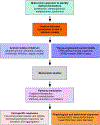Exploring the Pathophysiology of Delirium: An Overview of Biomarker Studies, Animal Models, and Tissue-Engineered Models
- PMID: 37851904
- PMCID: PMC10840625
- DOI: 10.1213/ANE.0000000000006715
Exploring the Pathophysiology of Delirium: An Overview of Biomarker Studies, Animal Models, and Tissue-Engineered Models
Abstract
Delirium is an acute brain disorder associated with disorganized thinking, difficulty focusing, and confusion that commonly follows major surgery, severe infection, and illness. Older patients are at high risk for developing delirium during hospitalization, which may contribute to increased morbidity, longer hospitalization, and increased risk of institutionalization following discharge. The pathophysiology underlying delirium remains poorly studied. This review delves into the findings from biomarker studies and animal models, and highlights the potential for tissue-engineered models of the brain in studying this condition. The aim is to bring together the existing knowledge in the field and provide insight into the future direction of delirium research.
Copyright © 2023 International Anesthesia Research Society.
Conflict of interest statement
The authors declare no conflicts of interest.
Figures


Similar articles
-
Prevalence and symptoms of delirium superimposed on dementia.Clin Nurs Res. 2006 Feb;15(1):46-66. doi: 10.1177/1054773805282299. Clin Nurs Res. 2006. PMID: 16410622
-
A prospective study of delirium in hospitalized elderly.JAMA. 1990 Feb 23;263(8):1097-101. JAMA. 1990. PMID: 2299782
-
Delirium is a risk factor for institutionalization and functional decline in older hip fracture patients.J Psychosom Res. 2014 Jan;76(1):68-74. doi: 10.1016/j.jpsychores.2013.10.006. Epub 2013 Oct 16. J Psychosom Res. 2014. PMID: 24360144
-
Current concepts in the management of delirum.Mo Med. 2007 Jan-Feb;104(1):58-62. Mo Med. 2007. PMID: 17410827 Review.
-
Effectiveness of multicomponent interventions on incidence of delirium in hospitalized older patients with hip fracture: a systematic review.Int Psychogeriatr. 2018 Apr;30(4):481-492. doi: 10.1017/S1041610217002782. Epub 2018 Jan 3. Int Psychogeriatr. 2018. PMID: 29295719
Cited by
-
Systemic Inflammation and Metabolic Changes After Cardiac Surgery and Postoperative Delirium Risk.J Clin Med. 2025 Jun 29;14(13):4600. doi: 10.3390/jcm14134600. J Clin Med. 2025. PMID: 40648974 Free PMC article.
-
The intersection of delirium and long-term cognition in older adults: the critical role of delirium prevention.J Neurol. 2025 May 6;272(6):381. doi: 10.1007/s00415-025-13104-1. J Neurol. 2025. PMID: 40329080 Review.
-
Nutritional Status and Inflammation as Mediators of Physical Performance and Delirium in Elderly Community-Acquired Pneumonia Patients: A Retrospective Cohort Study.Clin Interv Aging. 2024 Oct 3;19:1641-1652. doi: 10.2147/CIA.S483481. eCollection 2024. Clin Interv Aging. 2024. PMID: 39376978 Free PMC article.
-
Preoperative geriatric nutritional risk index as a predictor of postoperative delirium in revision arthroplasty: a 10-year retrospective cohort study.Front Med (Lausanne). 2025 Jul 16;12:1626383. doi: 10.3389/fmed.2025.1626383. eCollection 2025. Front Med (Lausanne). 2025. PMID: 40740942 Free PMC article.
-
The Pathophysiology and Biomarkers of Delirium.Semin Neurol. 2024 Dec;44(6):720-731. doi: 10.1055/s-0044-1791666. Epub 2024 Oct 17. Semin Neurol. 2024. PMID: 39419070 Free PMC article. Review.
References
Publication types
MeSH terms
Substances
Grants and funding
LinkOut - more resources
Full Text Sources
Medical

